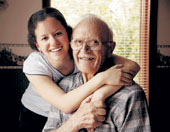 |
| Constant vigil: Dementia patients need round-the clock attention |
Four years ago, Padma Ram Ratnam wallowed in guilt each time she thought of getting away from her ailing husband and taking a break. Whenever the idea crossed her mind, she would bury it by plunging herself in household chores and nursing her 71-year-old husband who has dementia and suffers from Parkinson’s disease.
With time, her husband’s dementia worsened. “He doesn’t recognise me. He is completely dependent and bed-ridden,” says the 65-year-old, Bangalore-based retired school teacher. But with time, Ratnam’s feeling of guilt about wanting to get a life has vanished. She now plans to go out every day, meet normal people and talk of things other than illness. “I owe it to myself,” says Ratnam.
All the 46 people gathered at the meet of care givers for dementia patients ? held in Bangalore recently ? nodded in sympathy. That’s because everyone had a similar story to narrate. “Looking after a dementia patient needs patience and persistence. The problem is compounded because professional help is difficult to come by,” says Dr Radha Murthy, managing trustee of the Bangalore-based non governmental organisation Nightingales Medical Trust, which organised the support group meet.
The Alzheimers and Related Disorders Society of India (ARDSI) estimates that there are two million dementia patients in India, that is, three per cent of the total population. “The numbers are on the rise because longevity is going up,” says Murthy.
Dementia is a debilitating disease that usually occurs in old age. “Dementia patients lose touch with the present. They have hallucinations and are prone to wandering away from home and not being able to find their way back,” says Murthy.
An elders’ helpline run by the Nightingales Medical Trust has received 109 complaints about old people wandering away from home in the last four years. All of them were dementia patients. Only 49 were reunited with their families. “Many patients had wandered off in the middle of the night,” says Murthy. For these reasons, she adds, dementia patients need round-the-clock care. “Old age homes and hospitals refuse to take in dementia patients because they cannot provide 24-hour care,” adds Murthy.
Little professional help means family members have to double as care givers. “Dementia patients can be demanding and restless and tend to cling to their care givers. This causes burnout in the care giver,” says Murthy.
Last month, the Nightingales Medical Trust launched a two-pronged plan to support care givers of dementia patients. The NGO will hold a monthly support meet where care givers can discuss issues and thrash out problems. A specialist will be available to give medical guidance. “The meet is basically a platform for care givers to vent their frustration,” says Murthy.
The NGO will also start a day care centre for dementia patients. Care givers can leave their patients at the centre in the morning and collect them in the evening. “The day care centre will give respite to care givers for a few hours every day,” says the NGO’s managing trustee.
Murthy adds that the day care centre is also aimed at giving working couples a chance to pursue their jobs with an easy mind. “Several women who attended the support group meet said they had to quit jobs to look after dementia patients at home. This had led to frustration,” she says.
The Nightingales Trust’s first support group meeting was attended by 47 people. “Most of them were women who were looking after a parent, a parent-in-law or a husband,” says Murthy.
Revathi Sudhakar, who was among the most vocal speakers at the first support group meeting, says she found the session therapeutic. She is nursing her 73-year-old mother who has been suffering from dementia for the last three years. Sudhakar, who herself is touching 50 and going through pre-menopausal anxieties, says she has become a bundle of nerves in the last six months. “My mother has paranoid hallucinations that she is dying. I try and be patient with her, but sometimes I lose my cool and say harsh things. This leads to guilt on my part,” she says.
Once a social person, Sudhakar now dreads entertaining guests at home. “My mother insists on talking to them ? and she always says something embarrassing,” says Sudhakar.
As awareness about dementia is low, care givers often assume that patients act strangely on purpose. Murthy gives the example of Suresh Narayan who wanted to leave his mother, a dementia patient, at the Nightingales’ day care centre. When he broached the topic with his mother, she accused Narayan of conspiring to kill her. “Narayan and his wife were convinced that she was behaving badly on purpose. This led to further tension between mother and son,” says Murthy.
Despite several showdowns, Narayan’s wife, Shefali, is insisting that his mother be put in the day care. “She has had to quit her job to nurse her mother-in-law,” says Murthy.
While the Narayans are opting for day care, Padma Ram Ratnam plans to put her husband into a dementia care home. “It’s a last resort. I never thought I would want to send my ill husband away. But I am emotionally and physically drained,” she says.











